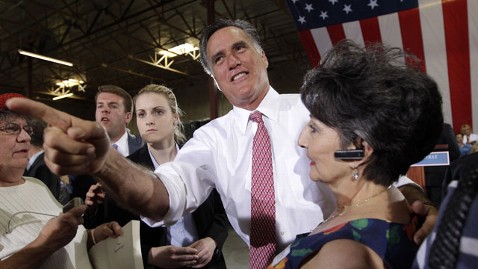With Texas Win, Romney Clinches the GOP Nomination

(Mary Altaffer/AP Photo)
Mitt Romney has clinched the Republican presidential nomination.
The Associated Press has projected he has won the Texas GOP primary, and ABC News estimates he will win 97 of Texas's 155 delegates, giving him the 1,144 needed to win the nomination.
"I am honored that Americans across the country have given their support to my candidacy and I am humbled to have won enough delegates to become the Republican Party's 2012 presidential nominee. Our party has come together with the goal of putting the failures of the last three and a half years behind us. I have no illusions about the difficulties of the task before us," Romney said in a statement.
" On Nov. 6, I am confident that we will unite as a country and begin the hard work of fulfilling the American promise and restoring our country to greatness," Romney said.
Before Tuesday's win, Romney had already looked ahead to the November general election against President Obama. The latest ABC News/Washington Post poll showed Romney and Obama nearly even, with the president leading his GOP challenger 49 percent to 46 percent among registered voters. With most respondents showing the economy as their primary concern, 47 percent said they trust Romney to do a better job handling the economy, while 46 said they trust Obama more.
Romney isn't the nominee yet. The 2,286 Republican delegates will officially confer that mantle in August when they select the nominee in a floor vote at the Republican National Convention in Tampa.
His campaign planned no victory party for this long-predicted mathematical triumph. Romney held two public campaign events today, one in Colorado and one in Nevada, and did not mention his imminent clinching of the nomination in either.
After Tuesday's vote, Romney has won 37 of the 49 Republican contests held so far. His nearest competitor, Santorum, won 10. Gingrich won two, and Paul has won none.
The win in Texas brings Romney one step closer to the official conclusion of a long campaign in which he held front-runner or co-frontrunner status from the outset. Romney staved off a revolving cast of Tea Party darlings who included Herman Cain, Michele Bachmann, Rick Perry, Newt Gingrich, Rick Santorum, and for a brief moment, Romney's now-surrogate Donald Trump.
The last major candidate standing against Romney was Ron Paul, the Texas congressman who announced on May 14 that he would no longer campaign in new primary states, but will still organize at state conventions to accrue delegates who will bolster his presence in Tampa, even if many of them will be allocated to Mitt Romney in the presidential-nomination vote.
After Santorum dropped from the race on April 10, Romney became the presumptive winner.
Thanks to a delayed primary calendar and pressure from the Republican National Committee for states to allocate delegates proportionally, this year's Republican primary has dragged on relatively late into the election year. John McCain also clinched the nomination with a win in Texas in 2008, but he did it on March 4.